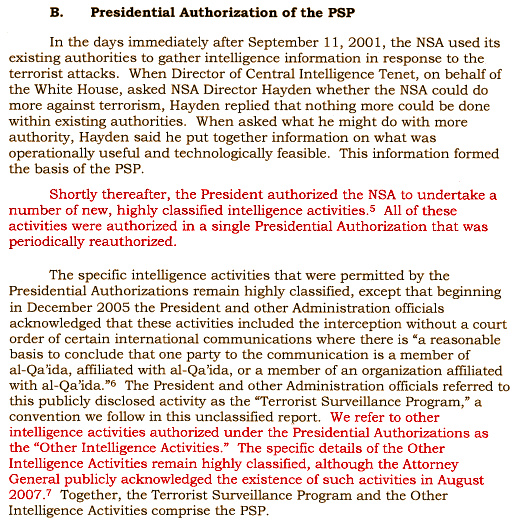In the beginning, they were bold, those Dark Siders, Dick Cheney and David Addington. If it were a spy novel, you might see what they did as almost heroic. For example, the illegal domestic surveillance program was instituted rapidly after 9/11, dreamed up by Vice President Dick Cheney and N.S.A. Chief Michael Hayden. Soon, John Yoo was involved, though no one knows exactly when. Whatever the case, it was approved by Attorney General John Ashcroft on the day first he heard about it [but he likely didn’t know what he was approving]. John Yoo seems to be the only person at the DoJ who really knew what they were doing. All of this is a brief summary from the beginning of this post:
When and To What Degree Was John Ashcroft Read Into the Illegal Surveillance Program?
By emptywheel
July 12, 2009
But the part I wanted to get to is further into the post:
Ashcroft Claims He Wasn’t Fully Briefed on Data Mining Aspects of ProgramThat all addresses when Ashcroft was read into the program–but not what he learned. At least according to Ashcroft, he was never fully briefed on what are presumably the vacuuming and data-mining aspects of the program [we know this because of all the leaks that make it clear that data mining was the primary issue behind the March 10 confrontation] until after Philbin and Goldsmith replaced Yoo. The IG Report explains:
In a May 20, 2004 memorandum, Ashcroft wrote that it was not until Philbin and later Goldsmith explained to him that aspects of the NSA’s Other Intelligence Activities were not accurately described in the prior Authorizations that he realized that he had been certifying the Authorizations prior to March 2004 based on a misimpression of those activities.The IG Report reinforces Ashcroft’s point here. It says that Yoo’s memos left out details on the Other Intelligence Activities that were part of the program.Yoo also discussed in his memoranda the legal rationale for Other Intelligence Activities authorized as part of the PSP. To the extent that particular statutes might appear to preclude these activities, Yoo concluded that "we do not believe that Congress may restrict the President’s inherent constitutional powers, which allow him to gather intelligence necessary to defend the nation from direct attack." However, as detailed in Chapter Three of the DOJ OIG report, Yoo’s discussion of some of the Other Intelligence Activities did not accurately describe the scope of these activities. Yoo’s factual description of these activities was later identified by his successors in the Office of Legal Counsel and ODAG in late 2003 as insufficient and presenting a serious impediment to recertification as to form and legality.
Given that these "Other Intelligence Activities" are almost certainly the data mining and vacuuming parts of the program, it’s not just FISA that Yoo was blowing off here; it was also the Electronic Communication Protection Act and the Wiretap Act. And, by the time Philbin and Goldsmith discovered the discrepancy between what Yoo had described and what was actually being done, it also violated Congress’ explicit prohibition in the 2004 Defense Appropriations Law against DOD conducting such activity. All of which seems to explain the issues behind Ashcroft’s bring read in on the program. He wasn’t involved in the initial discussions about the program [John Yoo may or may not have been]. And from that point going forward, he took his understanding of the program from Yoo’s description of it–which left out key details about the data mining and vacuum side of things.
Remember "Other Intelligence Activities?" From the IG Report:

Article the sixth… The right of the people to be secure in their persons, houses, papers, and effects, against unreasonable searches and seizures, shall not be violated, and no Warrants shall issue, but upon probable cause, supported by Oath or affirmation, and particularly describing the place to be searched, and the persons or things to be seized.
There’s a specificity to the Article Six Rights that hardly fits data-mining. So, I guess that’s why they wanted to go around the F.I.S.A. Court. It’s hard to argue for a warrant based on some computer search for words or phrases. I’m guessing that some kind of data-mining is the bulk of the President’s Surveillance Program. Big Brother stuff, sure enough…
Sorry, the comment form is closed at this time.